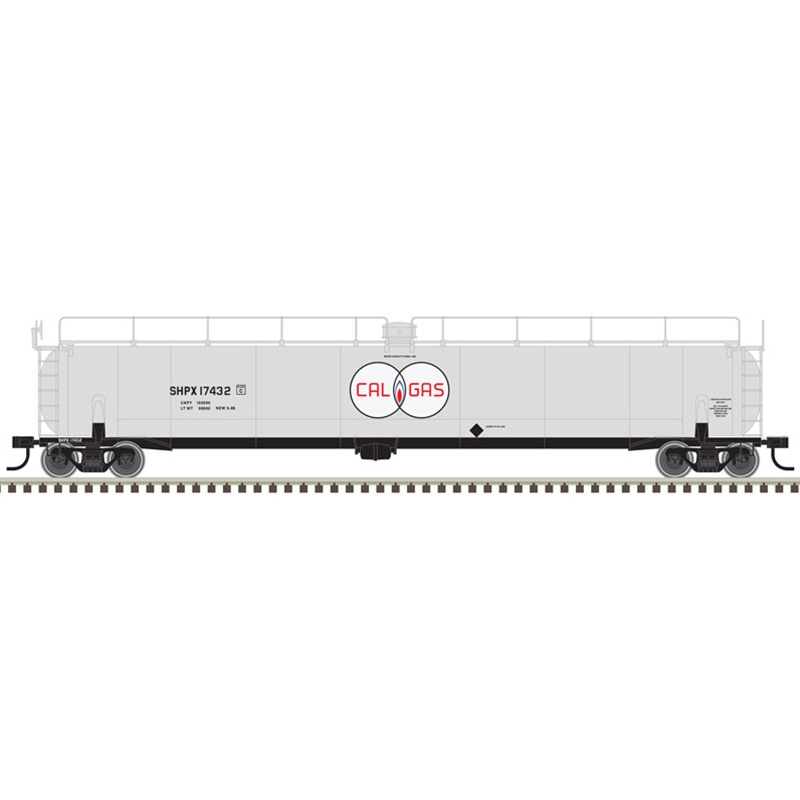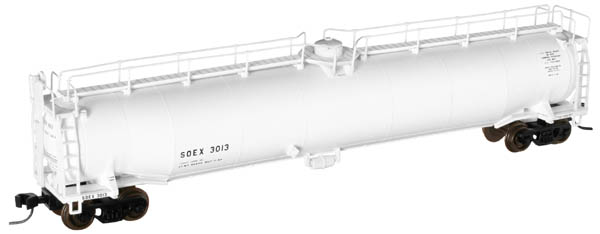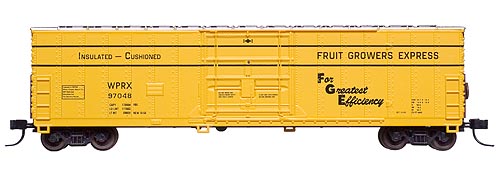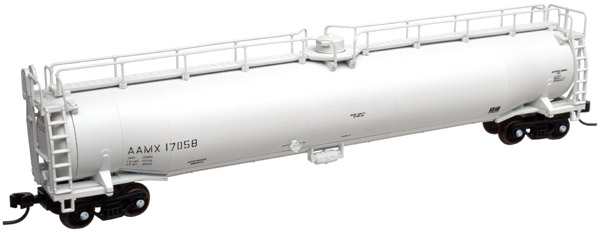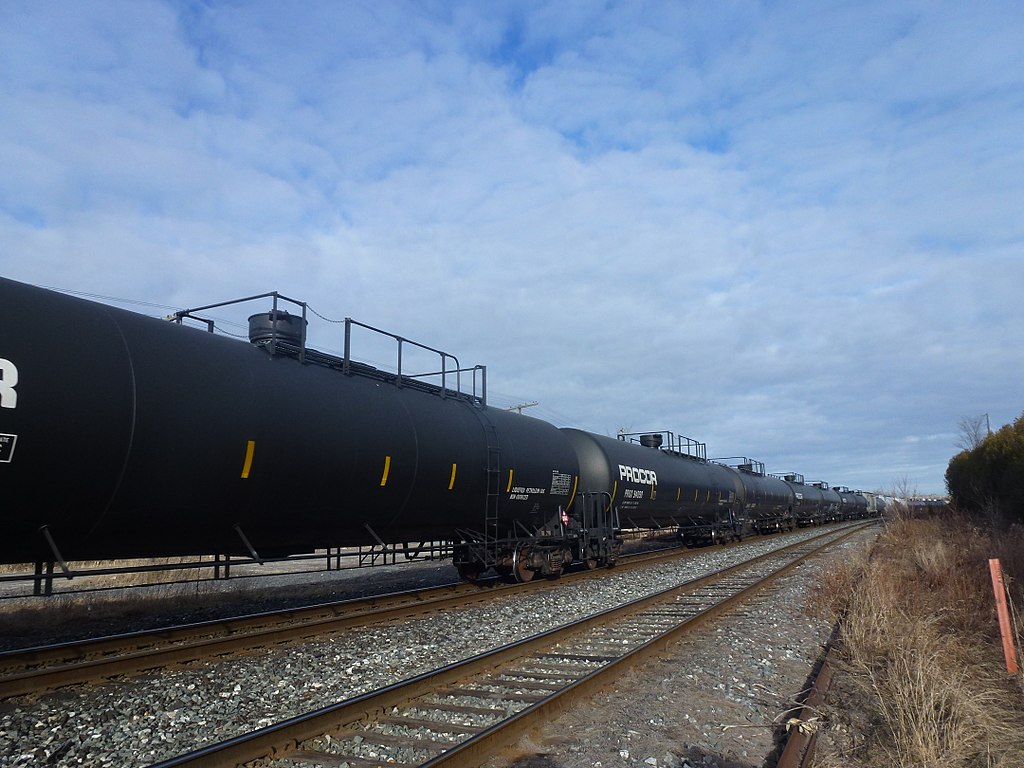Model Information: Model introduced in 1998. Features:
- Fine end ladders
- 100-ton roller bearing trucks
- Air reservoir
- Walkway and end platforms
- Intricate lettering on the ends
- Separate handrails
- Prototypically accurate paint schemes
Prototype History: Liquefied Petroleum Gas (LPG) (also called Autogas) is a liquefied mixture of propane and butane. It is an inevitable by-product of the crude oil refining process and of natural gas processing. In natural gas processing, the natural gas is cleaned off heavy hydrocarbons such as propane and butane before distribution. About 60% of global LP Gas supply comes from natural gas processing. In crude oil refining, LPG is a by-product of the refining process. LPG is gaseous at room temperature and changes to a liquid when compressed at moderate pressure or chilled. The chemical composition of LPG can vary, but is usually made up of butane and propane with a 30-99% propane mix.
The 33,900 gallon tank car is one of the largest standard tank cars used today. While Liquefied Petroleum Gas (LPG) and Anhydrous Ammonia are the two most common commodities, they are also used to transport butadiene, isoprene and gasoline. These cars can be seen regularly in mixed manifest freight trains throughout North America. They travel singly or in large blocks between producers and distributors.
The 33,900 gallon tank car is one of the largest standard tank cars used today. While Liquefied Petroleum Gas (LPG) and Anhydrous Ammonia are the two most common commodities, they are also used to transport butadiene, isoprene and gasoline. These cars can be seen regularly in mixed manifest freight trains throughout North America. They travel singly or in large blocks between producers and distributors.
Brand/Importer Information: In 1924 Stephan Schaffan, Sr. founded the Atlas Tool Company in Newark, New Jersey. In 1933 his son, Stephan Schaffan, Jr., came to work for his father at the age of sixteen. Steve Jr. built model airplanes as a hobby and frequented a local hobby shop. Being an enterprising young man, he would often ask the owner if there was anything he could do to earn some extra spending money. Tired of listening to his requests, the hobby-store owner threw some model railroad track parts his way and said, "Here, see if you can improve on this".
In those days, railroad modelers had to assemble and build everything from scratch. Steve Jr. created a "switch kit" which sold so well, that the entire family worked on them in the basement at night, while doing business as usual in the machine shop during the day.
Subsequently, Steve Jr. engineered the stapling of rail to fiber track, along with inventing the first practical rail joiner and pre-assembled turnouts and flexible track. All of these products, and more, helped to popularize model railroading and assisted in the creation of a mass-market hobby. The budding entrepreneur quickly outgrew the limitations of a basement and small garage operation. Realizing they could actually make a living selling track and related products, Steve and his father had the first factory built in Hillside, New Jersey at 413 Florence Avenue in 1947. On September 30, 1949, the Atlas Tool Company was officially incorporated as a New Jersey company.
In 1985, Steve was honored posthumously for his inventions by the Model Railroad Industry Association and was inducted into the Model Railroad Industry Hall of Fame in Baltimore, Maryland. In addition, Steve was nominated and entered into the National Model Railroad Association Pioneers of Model Railroading in 1995.
In the early 1990s, the Atlas Tool Company changed its name to Atlas Model Railroad Company, Inc.
In those days, railroad modelers had to assemble and build everything from scratch. Steve Jr. created a "switch kit" which sold so well, that the entire family worked on them in the basement at night, while doing business as usual in the machine shop during the day.
Subsequently, Steve Jr. engineered the stapling of rail to fiber track, along with inventing the first practical rail joiner and pre-assembled turnouts and flexible track. All of these products, and more, helped to popularize model railroading and assisted in the creation of a mass-market hobby. The budding entrepreneur quickly outgrew the limitations of a basement and small garage operation. Realizing they could actually make a living selling track and related products, Steve and his father had the first factory built in Hillside, New Jersey at 413 Florence Avenue in 1947. On September 30, 1949, the Atlas Tool Company was officially incorporated as a New Jersey company.
In 1985, Steve was honored posthumously for his inventions by the Model Railroad Industry Association and was inducted into the Model Railroad Industry Hall of Fame in Baltimore, Maryland. In addition, Steve was nominated and entered into the National Model Railroad Association Pioneers of Model Railroading in 1995.
In the early 1990s, the Atlas Tool Company changed its name to Atlas Model Railroad Company, Inc.
Item created by: CNW400 on 2019-10-17 08:43:39. Last edited by Alain LM on 2022-03-16 05:34:21
If you see errors or missing data in this entry, please feel free to log in and edit it. Anyone with a Gmail account can log in instantly.
If you see errors or missing data in this entry, please feel free to log in and edit it. Anyone with a Gmail account can log in instantly.


